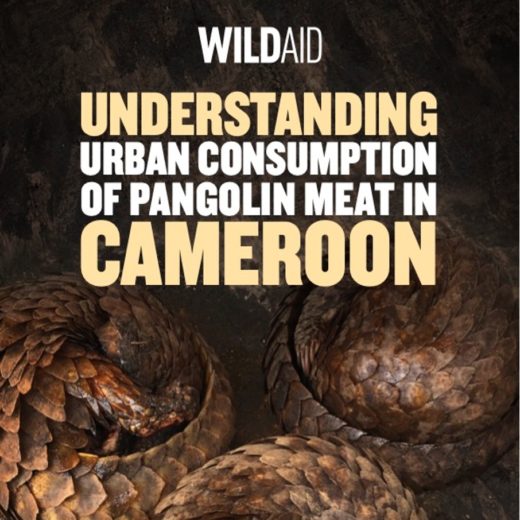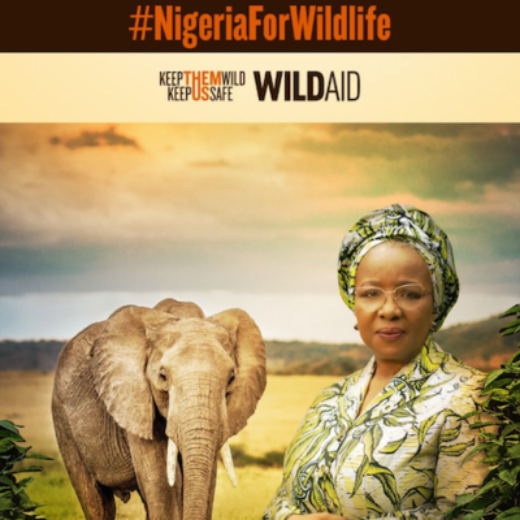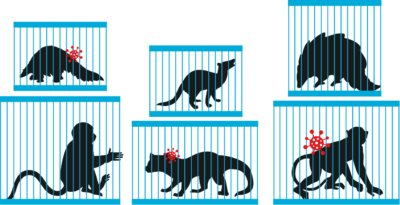
WildAid published a new survey report today that reveals consumption of wildlife or “bushmeat” is widespread in Nigeria’s top cities, regardless of consumer’s location, age, income, or the product’s potential links to zoonotic diseases.
As part of our ongoing work to protect wildlife and prevent pandemics, WildAid commissioned the survey of 2,000 people in Lagos, Abuja, Port Harcourt, and Calabar, all major centers for the bushmeat trade in Nigeria. The bushmeat trade is prevalent in West and Central Africa, with Nigeria being the transit point for illegal wildlife trade.
Conducted by GlobeScan, the report reveals that 71% of participants had consumed bushmeat at some point in their lives, and 45% had consumed it within the last year. COVID-19 was of concern to just 27% of consumers who said they stopped buying bushmeat, in a country that was previously impacted by an Ebola outbreak.
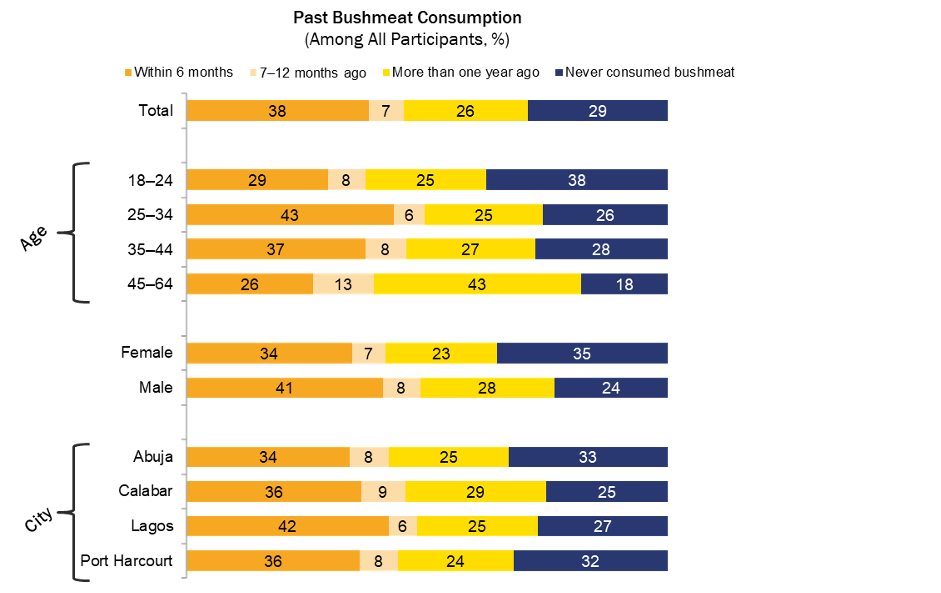

While bushmeat is an important part of food security in rural populations, rapid urbanization has caused a growing urban demand for bushmeat, despite widely available and affordable alternative protein sources. More than 50% of people who had consumed bushmeat within the last year cited taste as the main reason, while 30% said it was part of their culture, and 25% said that it is healthier and fresher than regular meat and fish.
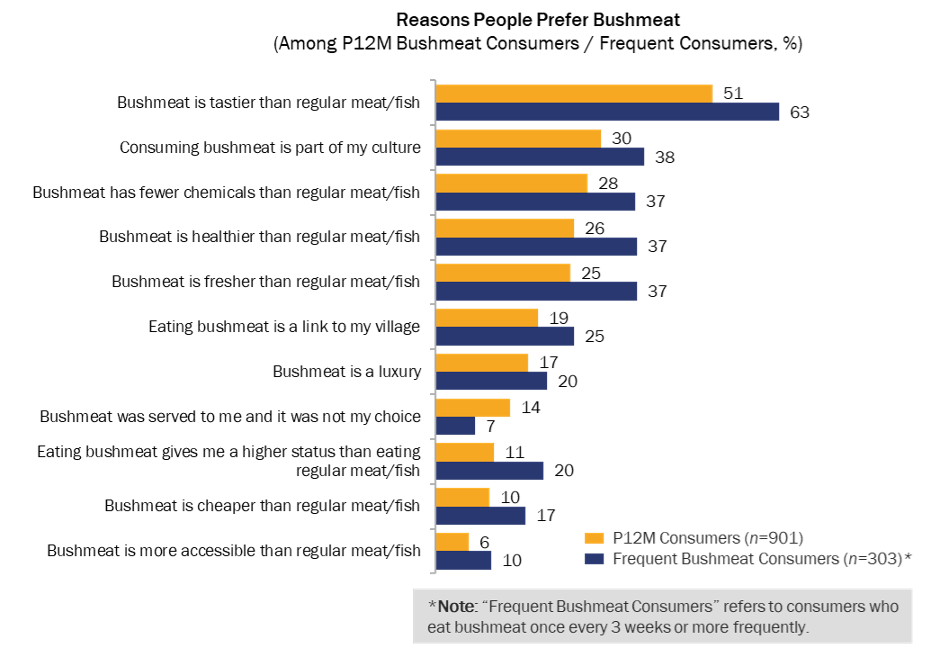

“The term ‘bushmeat’ is freely used in Nigeria to describe wildlife species erroneously believed to be free and available for poaching and consumption. In most cases, poachers are oblivious of the fact that these wild animals are protected by law. WildAid’s campaign against urban bushmeat consumption is a highly commendable and timely initiative that will not only assist in ensuring that our wild animals are left in the wild, but also help in the control, and keeping zoonotic diseases at bay. The outcome of the survey is quite revealing and will definitely form the basis for our step-up action against bushmeat consumption in Nigeria,” said Rasak Kolawole Adekola, Director of Nigeria’s Federal Department of Forestry, Federal Ministry of Environment.
The survey results also showed signs of public support for wildlife conservation, as 98% of those surveyed said there were existing alternatives to bushmeat in the form of fish, chicken, and other farmed meats. Additionally, nearly 70% of those surveyed said wildlife should be protected, and 59% believe wildlife is important for their national heritage.
However, the survey showed that public knowledge of existing wildlife legislation that prohibits hunting and trade of endangered species is low. Only 31% correctly identified that only some species are legal to buy/eat. 88% said that some or all bushmeat should be legal.
“We need to educate urban Nigerians, who typically live far away from forests where bushmeat is often harvested, about the risks of zoonotic disease, the conservation impact of the bushmeat trade and the fact that current wildlife laws prohibit the hunting and trade of several species,” said Linus Unah, WildAid West African Representative.
Faced with enormous threats, including hunting for bushmeat, wildlife species in Nigeria have declined dramatically over the past 50 years. Today, Nigeria has fewer than 50 lions, 100 gorillas, 500 elephants, and between 1,400 to 2,300 chimpanzees left in the wild. Between 2016 – 2019, over half of the pangolin scales seized globally came from Nigeria. This contributes to the global illegal wildlife trade, which is estimated to be worth between $7 billion and $23 billion annually.
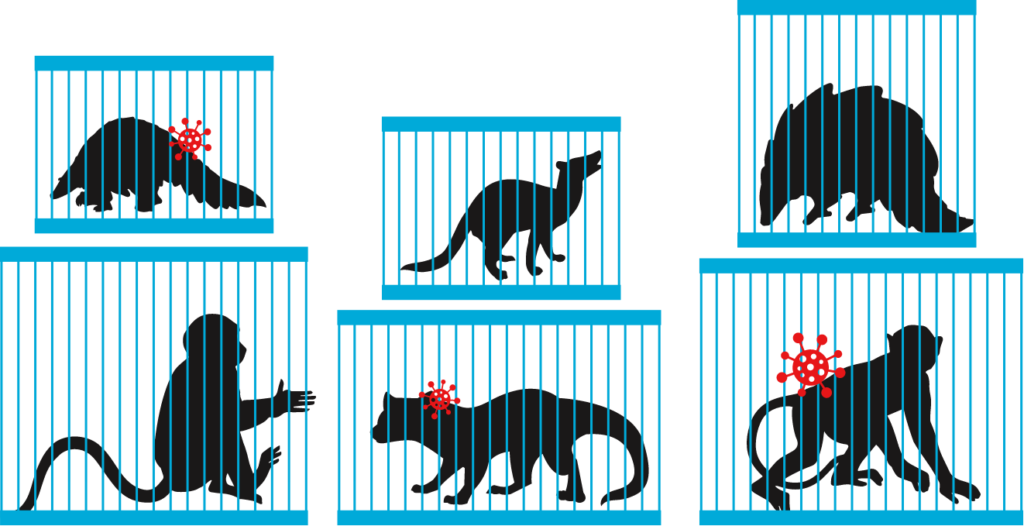

Investigations conducted by the Environmental Investigation Agency UK (EIA) have found that organized crime and endemic corruption have resulted in Nigeria becoming the world’s primary exit point for elephant ivory and pangolin scales trafficked from Africa to Asia. The same networks and routes used for the bushmeat trade are being co-opted for international wildlife trafficking.
“To help combat wildlife trafficking, the Nigeria government will soon launch the West African Strategy on Combating Wildlife Crime (WASCWC). In addition, with the support of international partners, Nigeria will also sign an Agreement with Cameroon under the Cooperation Framework Agreement to tackle transnational wildlife crime; and of course, the importance of advocacy, education and reach-outs is recognized and being pursued,” added Rasak Kolawole Adekola.
WildAid believes thatis drastic simplification of wildlife law is essential to public communication and active enforcement by local police. For example, in May 2020, China announced that going forward only a set list of animals will be allowed for human consumption. There is the potential for replication that addresses local priorities and species.
“Nigeria could lead the region in a new approach that recognizes the incredible risks of wildlife trade with improved enforcement and greater public awareness. Rather than an ever-growing list of endangered and high disease risk species that are prohibited from commercial trade, the government could communicate a very short list of “safe” game species, such as grasscutter, that are allowed, which could be easily understood by the public and enforcement officials,” said Peter Knights, CEO at WildAid.
Later this year, WildAid will launch a public awareness campaign in major cities across Nigeria to change consumer behavior and will collaborate with local Nigeria government agencies to improve enforcement and communication of existing wildlife laws.
With links to Ebola and SARS, and possibly to COVID-19, the global trade of wild animals has the potential for devastating social and economic impacts. Learn how you can join WildAid’s global efforts to protect wildlife and prevent future pandemics.
On February 9, 2021, GlobeScan and WildAid hosted a webinar to learn about this study and to discuss the best way to use these findings to protect Nigeria’s wildlife. Watch the webinar here.
Stay in touch and get the latest WildAid updates.
SIGN UP
